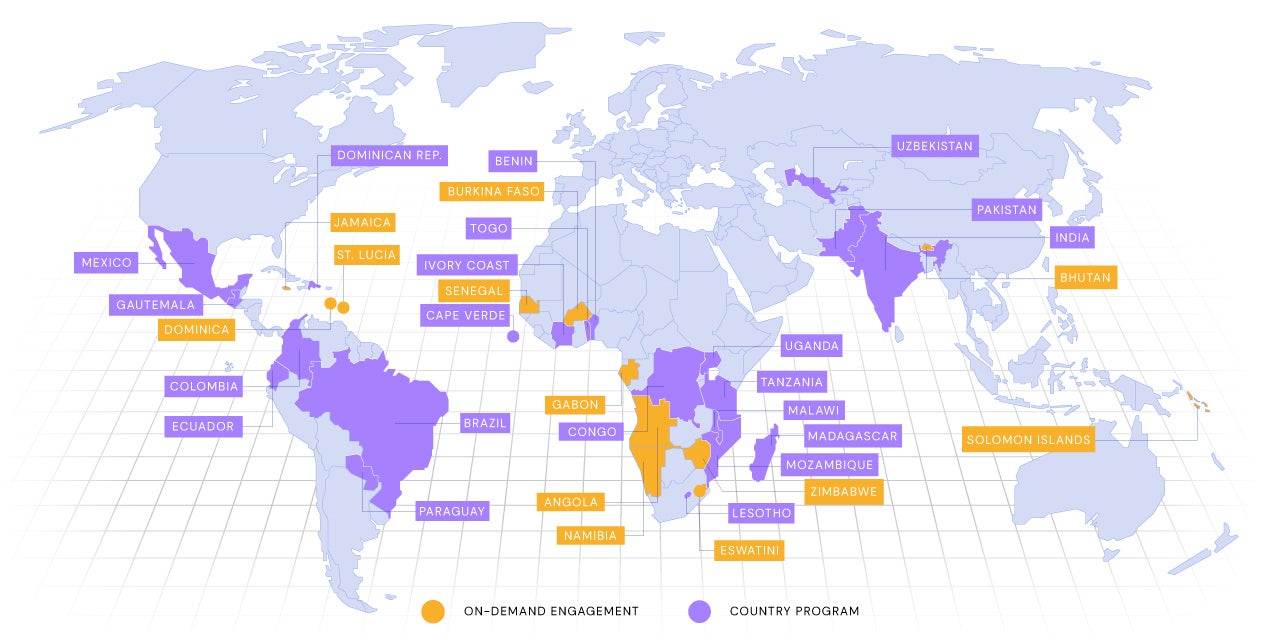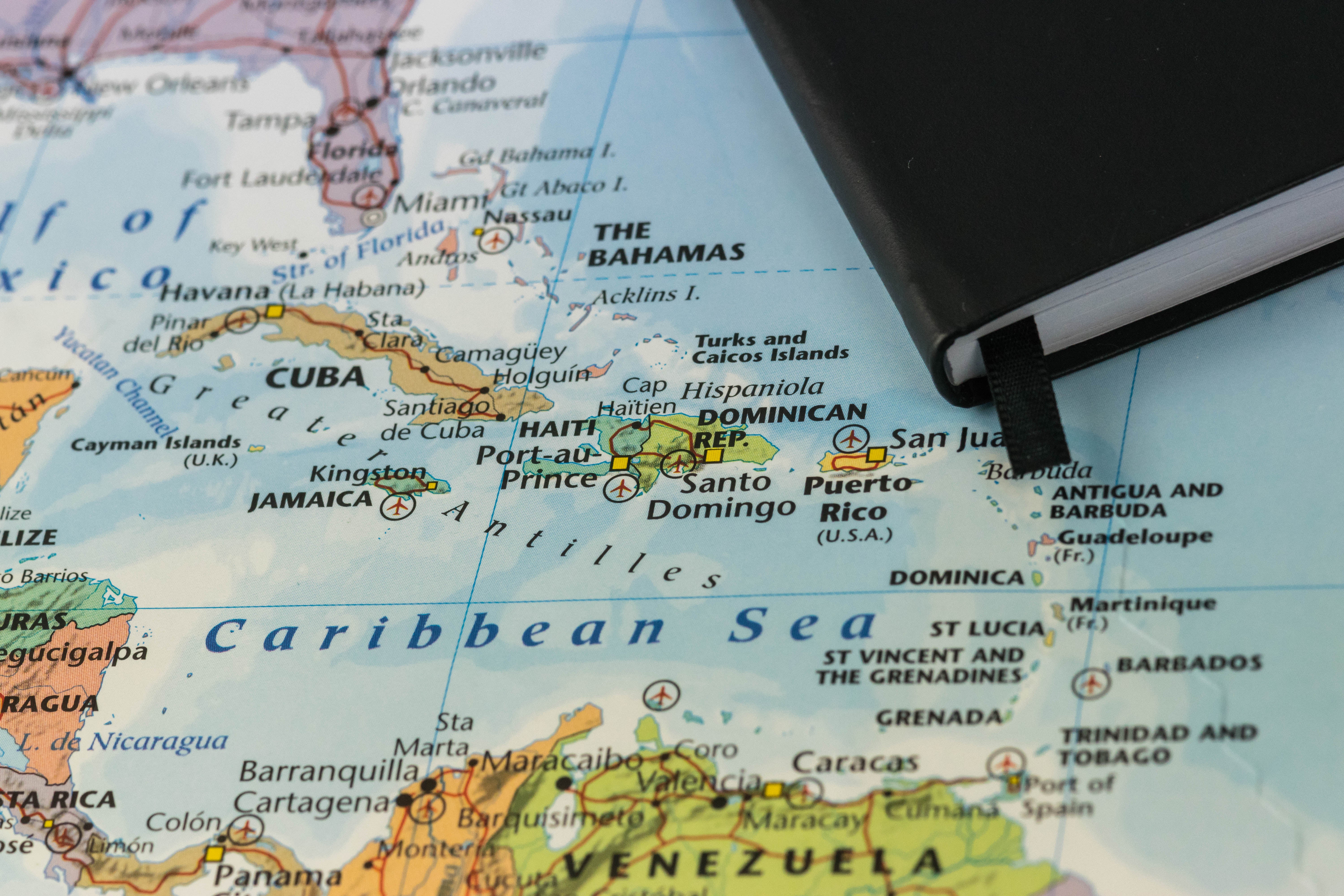GEI Priority Countries
GEI works closely with developing country governments that seek to improve or strengthen monitoring, evaluation and the use of evidence in their countries. Applying our integrated systems-based approach, we provide diagnostic, technical, training, professional development, knowledge curation/dissemination and other advisory support services to help governments at every step on this journey.

EXAMPLES OF COUNTRY WORK

Finding New Opportunities for Leadership on M&E
When Gustavo Petro’s administration took office in Colombia in August 2022, an important report awaited his policymakers – a summary of all the public policy evaluations conducted by the National Department of Planning (DNP) over the last four years, with clearly worded explanations of findings and recommendations on next steps. This report was the first of its kind in Colombia’s lauded history of efforts around national monitoring and evaluation (M&E) and was an important step in Colombia’s latest effort to increase the use of evaluation findings by the public sector and the general public. A team from the Global Evaluation Initiative (GEI), worked closely with the DNP, Colombia’s agency tasked with national M&E efforts, on this report, producing a document quite different than past reports.
When Gustavo Petro’s administration took office in Colombia in August 2022, an important report awaited his policymakers – a summary of all the public policy evaluations conducted by the National Department of Planning (DNP) over the last four years, with clearly worded explanations of findings and recommendations on next steps. This report was the first of its kind in Colombia’s lauded history of efforts around national monitoring and evaluation (M&E) and was an important step in Colombia’s latest effort to increase the use of evaluation findings by the public sector and the general public. A team from the Global Evaluation Initiative (GEI), worked closely with the DNP, Colombia’s agency tasked with national M&E efforts, on this report, producing a document quite different than past reports.

You Need Several Arms to Encircle a Baobab Tree: Madagascar Moving Forward on National M&E
Over two years of hard work, negotiation, patience and grit had culminated in this moment of progress. Madagascar government representatives, development partners and international donors sat together, discussing ways to support Madagascar’s plan to build their national monitoring and evaluation system – with each stakeholder offering support on a different element of the “Joint Roadmap.” This was a moment that the Center for Learning on Evaluation and Results for Francophone Africa (CLEAR-FA), an Implementing Partner of the Global Evaluation Initiative (GEI), had brought to fruition by building trust, nurturing relationships and navigating a complex political context.
Over two years of hard work, negotiation, patience and grit had culminated in this moment of progress. Madagascar government representatives, development partners and international donors sat together, discussing ways to support Madagascar’s plan to build their national monitoring and evaluation system – with each stakeholder offering support on a different element of the “Joint Roadmap.” This was a moment that the Center for Learning on Evaluation and Results for Francophone Africa (CLEAR-FA), an Implementing Partner of the Global Evaluation Initiative (GEI), had brought to fruition by building trust, nurturing relationships and navigating a complex political context.

Powered by Evidence: Mozambique's Journey
Since Mozambique emerged from civil war three decades ago, it has made enormous strides. Mozambique's civil society and international donors have called on the government to improve transparency, good governance, and the impact of policies on its people. Additionally, recent global crises emphasize the need for resilience and the ability to do more with less. The Mozambique government has shown a strong willingness and commitment to respond to these challenges. GEI Implementing Partner, the Center for Learning on Evaluation and Results for Lusophone Africa and Brazil (CLEAR-LAB), in collaboration with UNICEF-Mozambique, are working closely with government partners to support the institutionalization of evaluation and the use of evidence for decision-making and learning in Mozambique.
Since Mozambique emerged from civil war three decades ago, it has made enormous strides. Mozambique's civil society and international donors have called on the government to improve transparency, good governance, and the impact of policies on its people. Additionally, recent global crises emphasize the need for resilience and the ability to do more with less. The Mozambique government has shown a strong willingness and commitment to respond to these challenges. GEI Implementing Partner, the Center for Learning on Evaluation and Results for Lusophone Africa and Brazil (CLEAR-LAB), in collaboration with UNICEF-Mozambique, are working closely with government partners to support the institutionalization of evaluation and the use of evidence for decision-making and learning in Mozambique.

Asia Pacific
IPDET held a training series for parliamentarians and parliament staff from the Asia Pacific Region in collaboration with the Asia Pacific Evaluation Association, and the Global Parliamentarians Forum for Evaluation. 15 parliamentarians, 46 parliament staff and 2 government officials from 15 countries successfully completed the program.
IPDET held a training series for parliamentarians and parliament staff from the Asia Pacific Region in collaboration with the Asia Pacific Evaluation Association, and the Global Parliamentarians Forum for Evaluation. 15 parliamentarians, 46 parliament staff and 2 government officials from 15 countries successfully completed the program.

CARICOM
Through its partner CLEAR-LAC, GEI supported countries in the Caribbean Community (CARICOM) with establishing a planning, monitoring, evaluation and reporting system based on the principles of Results-Based Management (RBM). Through this multi-year support agreement requested by CARICOM, GEI is providing a range of advisory and training support. Most recently, a 7-session training workshop was held for the CARICOM Results-based Management Leadership Group (CRLG) for more than 70 attendees from 15 countries and several regional institutions.
Through its partner CLEAR-LAC, GEI supported countries in the Caribbean Community (CARICOM) with establishing a planning, monitoring, evaluation and reporting system based on the principles of Results-Based Management (RBM). Through this multi-year support agreement requested by CARICOM, GEI is providing a range of advisory and training support. Most recently, a 7-session training workshop was held for the CARICOM Results-based Management Leadership Group (CRLG) for more than 70 attendees from 15 countries and several regional institutions.

Cote d’Ivoire
CLEAR Francophone Africa, 3ie, WACIE, and UNICEF, among others, hosted an impact evaluation conference in Cote d’Ivoire. The event focused on the role and contributions of impact evaluation in the implementation of public policies in the context of the Sustainable Development Goals, the African Union's Agenda 2063, and the need to keep Francophone Africa states on track to achieving the SDGs
CLEAR Francophone Africa, 3ie, WACIE, and UNICEF, among others, hosted an impact evaluation conference in Cote d’Ivoire. The event focused on the role and contributions of impact evaluation in the implementation of public policies in the context of the Sustainable Development Goals, the African Union's Agenda 2063, and the need to keep Francophone Africa states on track to achieving the SDGs